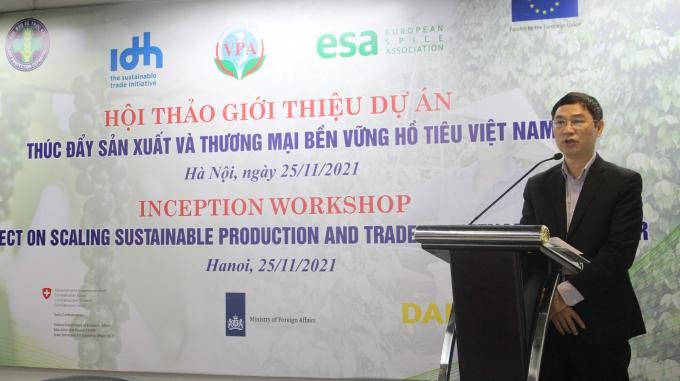- Giới thiệu
- Nhóm Công tác
- Tin tức
- Thông tin về FTA
- Tài Liệu
- Sự kiện
- Liên hệ
Promoting sustainable production and trade of Vietnamese pepper
The EU funded project will contribute to improving the environment, promoting sustainable production and trade, increasing farmers’ income
On November 25th, the Department of Plant Protection (Ministry of Agriculture and Rural Development - MARD) in collaboration with the Sustainable Trade Initiative (IDH) and the Vietnam Pepper Association (VPA) held a workshop to introduce the project. “Promoting sustainable production and trade of Vietnamese pepper”.

Mr. Nguyen Quy Duong, Deputy Director of Plant Protection Department (MARD) spoke at the workshop.
Promoting sustainable development for the pepper industry
According to Mr. Huynh Tien Dung, Country Director of IDH Vietnam, the project is within the framework of the ASEAN Regional Integration Support from the EU (ARISE Plus), assisting the Government of Vietnam in achieving the benefits from new bilateral and regional trade commitments, focusing on the implementation of the EVFTA, promoting the exportation of high-quality products and services from Vietnam to the EU.
The project will have its attention on small and medium pepper enterprises, thereby bringing benefits to smallholder farmers. Vietnam is the world's largest black pepper producer and exporter (accounting for 60% of world trade) with output in 2019 reaching 250,000 tons, accounting for approximately 45% of pepper imports into the EU.
Despite having a large export volume, Vietnam's pepper industry is currently facing challenges such as reducing international competitive advantages in terms of quality and price, notably the unreasonable use of agrochemicals, therefore only 40% of pepper production volume can meet import markets' requirements of residues.
Vietnamese pepper farmers and small and medium enterprises are facing a serious risk of losing market share if quality control measures following European and US standards are not put in place.
On that basis, the project aims to increase income for farmers, contribute to improving the environment in Vietnam, and promote sustainable production and trade for Vietnamese pepper: increase 15% in income from pepper production among 20% of farming households participating in the project; increase 5% of the area where farmers apply sustainable production standards; increase 5% in certified pepper of companies participating in the project; increase 15% of pepper production volume that meets EU market residue standards.
The project implementation period is expected to be from 2021 to 2023. The location will be in the provinces of Dak Lak, Dak Nong and Gia Lai. The total capital (non-refundable aid) is over 1 million euros (800,000 euros from the EU and 262,882 euros from IDH Netherlands).
Regarding the project organization and implementation, IDH Vietnam together with the VPA will closely coordinate with the Plant Protection Department to integrate the activities within the approved project framework with the approved plan of the pepper public-private partnership group. The goal is to intercept and solve the main problems concerning the current development of Vietnamese pepper, particularly solutions to improve the management of responsible use of agrochemicals.
Enhancing Vietnamese pepper’s competitivity
As shared by Mr. Matthieu Penot, European Commission Attaché to Vietnam, many processing companies of the EU have come to Vietnam to invest, bringing with them modern technology and production know-how. They fully understand the strict requirements of the European market. The EU countries have the same requirements for quality control and pesticide residue thresholds, so the question is how Vietnam's pepper industry can improve and maintain its inherent competitive advantages.
The project will serve as a place to share knowledge on good agricultural practices that ensure traceability and meet EU markets’ requirements, help Vietnam gain more grand opportunities after signing the EVFTA and non-tariff access to major commodity markets in the world.
Tin liên quan
PSAV Attends the 30th Anniversary Celebration of Cargill Vietnam2025/10/23
Plant health management helps increase coffee yield up to 15%2025/10/16
An Giang to host 2025 OCOP forum for sustainable development2025/09/25
Viet Nam and France foster cooperation on blue economy and sustainable environment2025/09/29



 Điều lệ hoạt động
Điều lệ hoạt động



















































